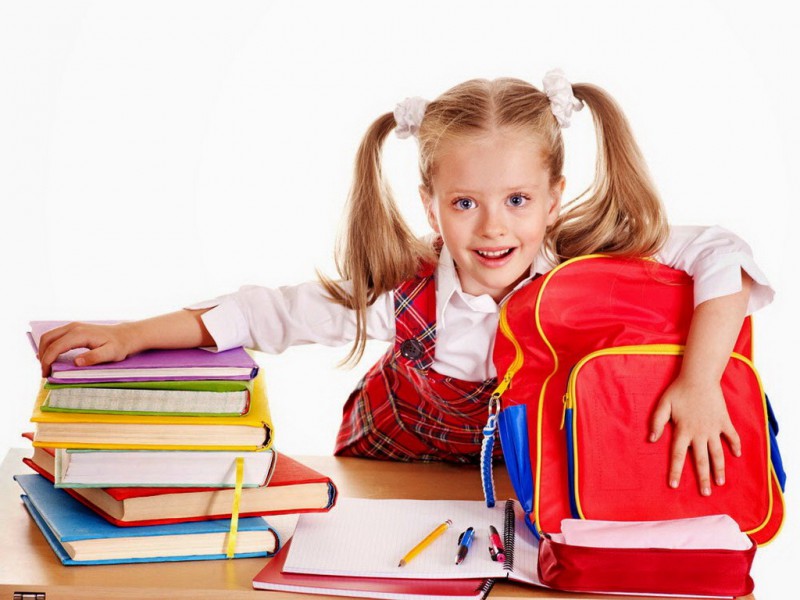
The article will tell you how to develop a preschooler in front of the school.
The content of the article
- Requirements for the preparation of the child for school: List
- Home preparation of a child for a school for reading: Developing tasks for children
- Home training of a child for a school development school: Developing tasks
- Home training of the child for school in writing: Developing tasks
- Home training of the child for school in mathematics: Developing tasks
- Psychological and emotional preparation of the child for school: games, tasks, exercises
- Psychological and emotional training of children for school: Testing. Diagnosis of general training of the child for school: Tests
- Video: "Intellectual development of a preschool child"
Requirements for the preparation of the child for school: List
To instill interest to the child to study something new, read, write, receive knowledge, from an early age. Now it is customary to send children to the first grade, already able to count, draw, write and know the letters and numbers that distinguish the names of animals, flowers, plants.
Educators and parents at home should teach this in kindergartens. Moreover, there is even a list of skills that the child should possess before going to school.
What should the baby be able to:
- Know your full name, the names of their parents, their professions, the date of birth and the address of residence.
- Distinguish and know the names of 12 primary colors: red, pink, orange, yellow, green, light green, blue, blue, purple, black, white, brown.
- Have the idea of \u200b\u200bthe day of the week: how many of them, what weekends, what working days, as it is called every day.
- Know the seasons (seasons), it is advisable to know the name of the months (at least some).
- Know the names of the main professions:doctor, nurse, teacher, director, driver, policeman, firefighter, cleaner, seller, miner, builder and so on.
- Distinguish where the left and where is the right
- Know the names of animals and their cubs:a cat is a kitten, a horse is a foal, a dog is a puppy and others.
- Know the names of the main birds: chicken, rooster, crow, forty, sparrow, tit, bullfinch, gull.
- Know the names of transport (basic): car, bus, motorcycle, tram, minibus, taxi.
- Have the concepts of orientation: above, below, in the corner, back, in front.
- Distinguish vegetables from fruits, call them: tomato, cucumber, eggplant, zucchini, corn, pumpkin, pepper, onion, garlic, apple, pear, banana, peach and other basic names.
- Call their parts of the body and understand their necessity:the eyes look, the legs walk, the pens grab, the nose breathes, the mouth says, the head thinks.
"Mathematical" requirements:
- Count up to 10 (both with 0 and with 10 - i.e.
- Compose numbers (two -digit)
- Distinguish the concepts of "more" and "less"
- Navigate the concepts of: "tall" and "low"
- Distinguish and call the main figures
What speech skills should have:
- Repeat and retell simple stories
- Invent a story, looking at the picture
- To be able to retell and tell simple poems.
- Know or compose fairy tales
- Understand the questions posed and trying to answer them.
- Remember a few pictures at once
- Be able to finish the proposal (come up with the ending)
- Understand what word or picture in a row is superfluous
- Guess children's riddles
Another skills:
- Know the names of letters, possibly sounds
- Find a word for a picture
- Be able to circle figures and letters along the contour
- Pencil
- Understand what is good and what is bad
- Understand how to "behave diligently"
- Respect elders
- Have social skills (to be in a team)
Important: how high -quality, easily and quickly the child will perceive information at preschool age depends only on the intensity of classes, attention of parents, the warehouse of the mind, genetic heredity and desire.
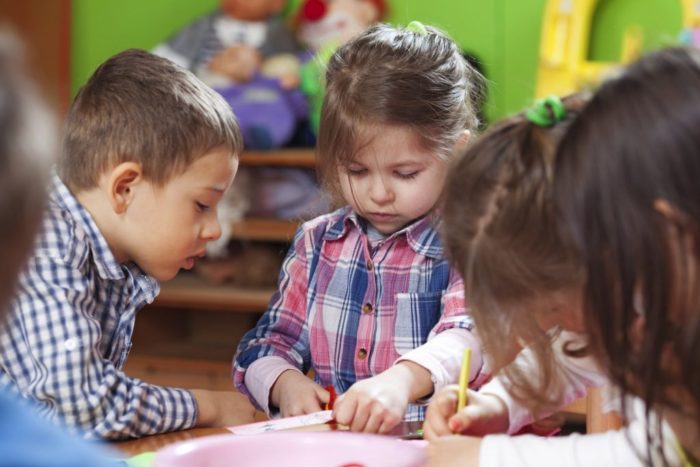
Preschool skills in front of grade 1
Home preparation of a child for a school for reading: Developing tasks for children
You should train and develop your child at home long before you are going to give him to first grade. It is important to correctly calculate the load that you can put on the baby, do not force him to engage if he does not want to, use modern methods, visualization, games.
Reading for preschoolers can divide into several stages:
- Preparation for training
- Studying letters
- Studying syllables
- Reading words
- Reading phrases
- Reading sentences
Preparation for reading learningit is to interest the child. To do this, use game moments. The ideal age for starting reading is 4 years.
How to conduct classes:
- Warm -up (articulation).You need to prepare for classes, learn to inhale and exhale the air correctly (calmly and measuredly).
- Speech development exercise.Try to teach the baby to clearly pronounce the letters (especially buzzing, ringing and hissing).
- Repetition and study of the letters of the alphabet.Be sure to demonstrate pictures and words for the letters studied.
- Reading syllables.Starting with simple, ending with complex. You can transfer this lesson to the game by writing a syllable on paper and drawing parts of the body to them.
- Reading simple and iconic words by syllables:ma-ma, p-pa, ku-ku and so on.

Lesson No. 1
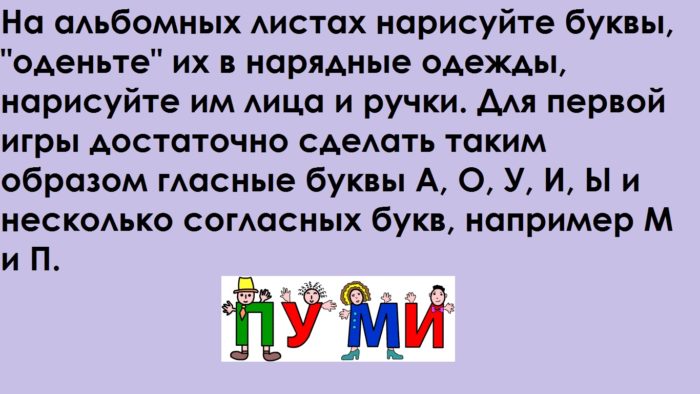
Lesson No. 2
Home training of a child for a school development school: Developing tasks
The development of speech with the baby should occur from the first months of life, when mother monitors what sounds her baby reproduces. The development of the baby’s speech should include several types of classes:
- Speech therapy.If there are certain problems with pronounce certain letters and words. You should pronounce tongue twisters and do exercises for the speech apparatus.
- Games for speech development. Various games for compiling phrases and sentences, guessing words.
- Phonetic games. Tasks in which the baby must guess and recognize sounds in words.
- Development of the articulatory and speech apparatus (help improve speech and get rid of speech therapy problems).
- Study of poems.Increases vocabulary and develops speech, makes it more coherent.
- Games in the puppet theater. Help the child to put speech correctly.
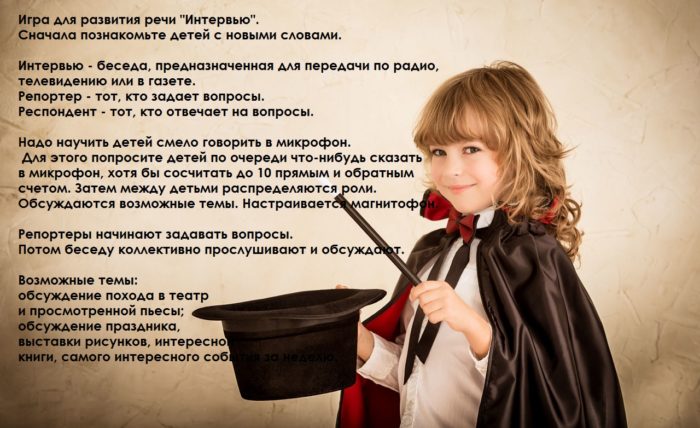
Task number 1
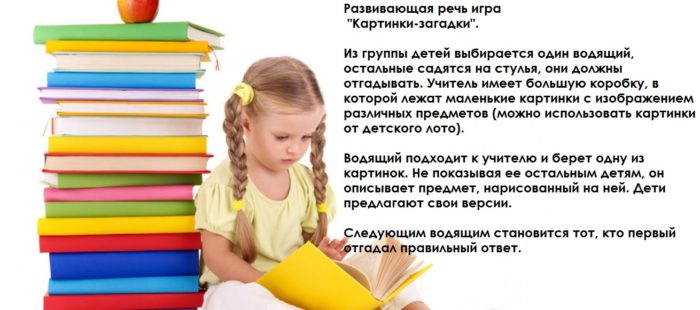
Task number 2
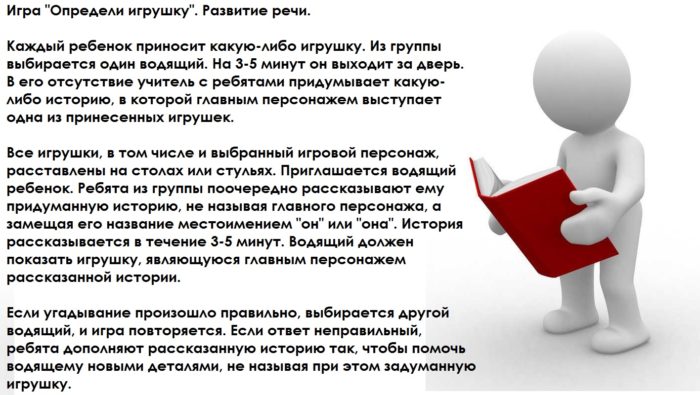
Task number 3
Home training of the child for school in writing: Developing tasks
There are a number of exercises for young children who help to form the right writing skills among preschoolers:
- Hatching.You can specifically purchase notebooks, prescriptions and exercises collections or draw on clean sheets of paper. The bar is an addition to the picture by straight, oblique, vertical or horizontal strokes.
- Graphic dictation. This is drawing on cells. The task is to circle the exact number of cells to make a certain pattern. Each line along the cell (left, right, up, down) should dictate an adult.
- Mirror drawing.To do this, the child is given only half the sketch (the face of a person or an animal muzzle), which must be completed.
- Letter through a copy.It interests the baby and stimulates him to display each line.
- Translation of pictures through light on glass. To do this, in the daytime you can use the window, and in the evening - a glass table and a lamp. The lesson develops in the child the desire to lead a flat line.
- Circuits. The baby needs to circle the dashed drawing and get a picture.
- Circle by numbers. It is necessary to circle the numbers strictly in the correct order in order to get a picture.
- Work in the prescriptions. They can independently make each mother on their own or purchase a ready -made notebook with tasks.
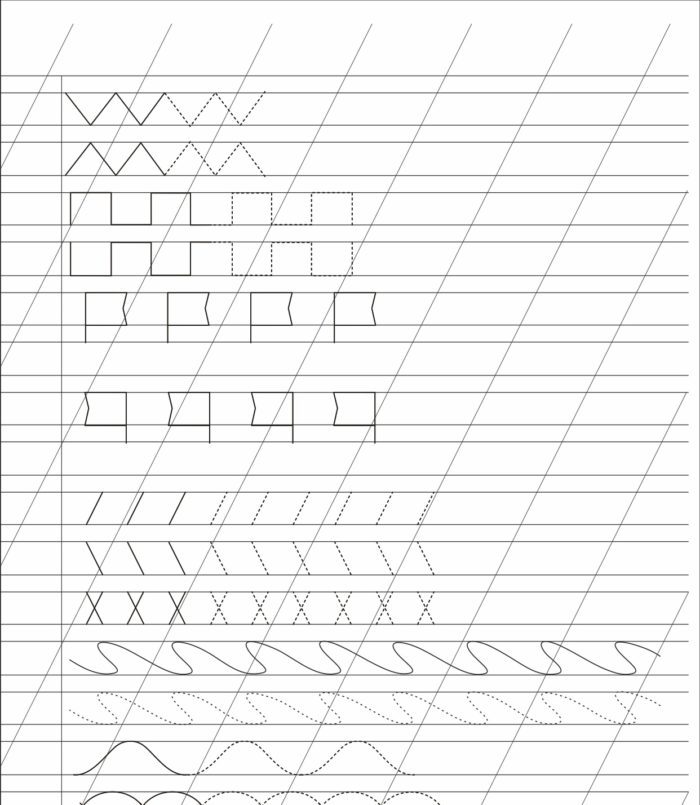
Task number 1

Task number 2
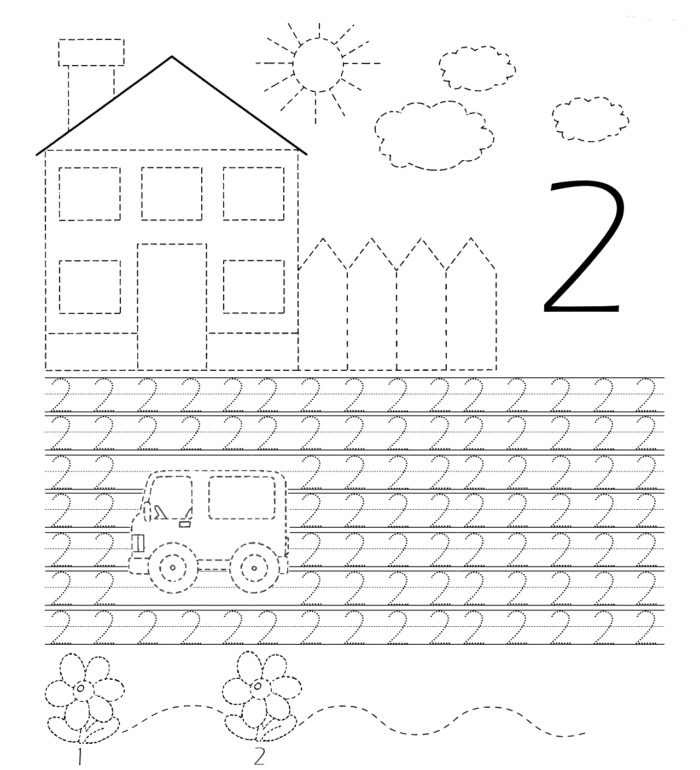
Task number 3
Home training of the child for school in mathematics: Developing tasks
Mathematics at an early age should be taught the baby with the help of applied practical examples, with the participation of toys and objects (fruits, pictures, cartoons).
What tasks to use:
- To teach a child count up to 10.Use counting sticks or any other items for this.
- Recording "numbers". Helps kids not only learn to count, but also remember the numbers visually.
- Learn to draw and call geometric shapes. Count their number of sides, corners, dimensions: large, small
- Solve simple examples of the addition and subtraction: Stack and take: 2+1, 3-1 and others.
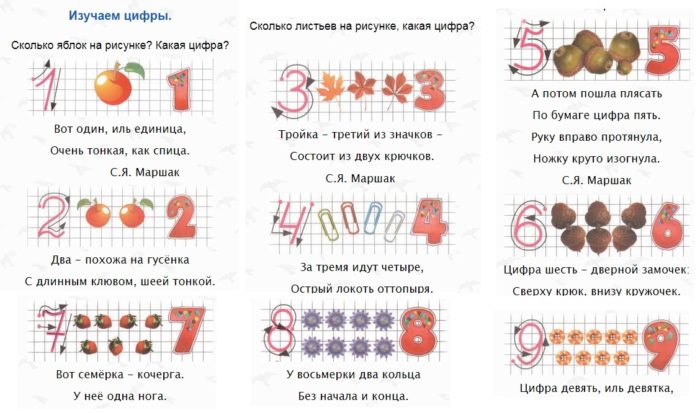
Mathematics
Psychological and emotional preparation of the child for school: games, tasks, exercises
It is much easier to prepare a child for school, having mastered mathematical science, reading or writing than a psychological mood. First of all, before going to grade 1, the baby must fully realize the seriousness of this action, have social skills, communicate with children, interact with them and with older (teachers).
What the baby should know:
- All children go to school
- Going to school is interesting and fun
- At school you can not only study, but also have fun
- School will help to succeed
- You can find friends at school
- No need to be afraid of school
- Teachers need to be respected, he does not want evil
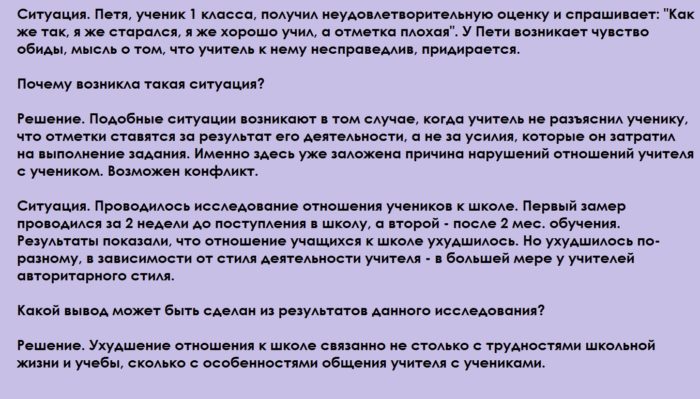
Game "Situation"
Psychological and emotional training of children for school: Testing. Diagnosis of general training of the child for school: Tests
The emotional readiness of the child for school depends on how his parents and educators in school tunge his houses. The baby should be configured in advance that he does not experience stress when he remains alone in the walls of the class. At this age (in which the child is preparing for school), he should already be fully formed as a person, to have everyday skills.
Important: the child’s emotional readiness for school suggests that he knows how to regulate his mood in any situation.
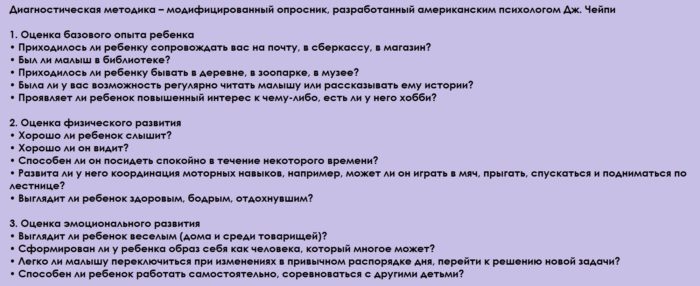
Testing: Part 1
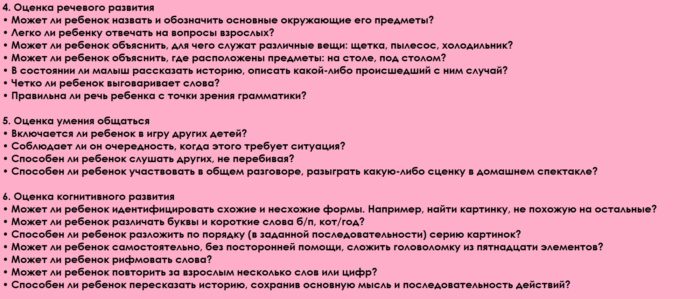
Testing: Part 2
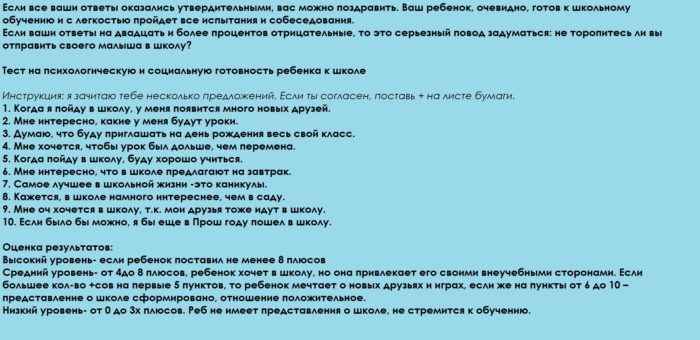
Testing: Part 3
